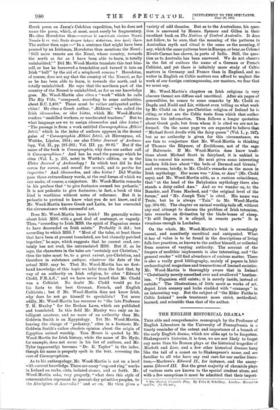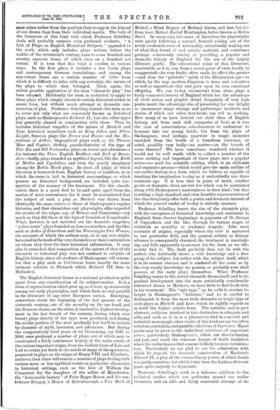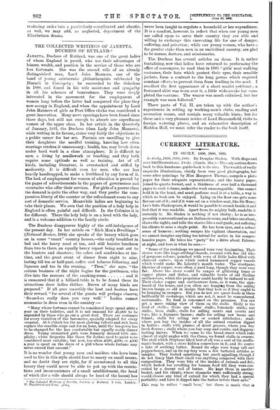THE ENGLISH HISTORICAL DRAMA.* •
THIS able and comprehensive monograph by the Professor of English Literature in the University of Pennsylvania is a timely reminder of the extent and importance of a branch of the early English drama, which are alike apt to be forgotten. Shakespeare's histories, it is true, we are not likely to forget any more than his Roman plays or the historical tragedies of Macbeth and Lear, and a few other historical dramas hang like the tail of a comet on to Shakespeare's name, and are familiar to all who have any real care for our earlier litera- ture,—Marlowe's Edward II., for instance, and the anony- mous Edward III. ' But the great majority of chronicle plays of various sorts are known to the special student 'alone, and with a few exceptions it must be admitted that their import- • The RtigEish Chronicle Pimp By Felix E. Schelling. London: Macmillan and Co. [8s. 61. mt.} anoe arises rather from the position they occupy in the history of our drama than from their individual merits. The bulk of the. literature of this kind with which Professor Schelling deals will probably surprise even professed students. " A List of Plays on English Historical Subjects " appended to the work, which only includes plays written before the middle of the seventeenth century, runs to some hundred and seventy separate items, of which close on a hundred are extant. It is true that this total is swollen in various ways. In the first place, it includes a few Latin plays and contemporary German translations, and among the non-extant items are a certain number of titles from which it is difficult to infer, with any certainty, the nature of the plays to which they belonged. Then, again, the widest possible application of the term "chronicle play" has been adopiwd. Habitually the term, is restricted to apply to those plays which simply chronicle certain historical events in scenic form, but without much attempt at dramatic con- struction of plot. Professor Schelling extends the term so as to cover not only what are commonly known as historical plays, such as Shakespeare's Richard II., but also other types leas generally classed in conjunction with these. Thus he includes historical tragedies of the nature of Macbeth and Lear, historical moralities such as King Johan and Albion Knight, Senecan plays like Ferrer and Porrex and the Mis- fortunes of Arthur, biographical plays such as Sir Thomas More and Captain Stokely, pseudo-histories of the type of Fair Em and Old Fortunatus, plays on travel and adventure— for instance the Three English Brothers and Dick of Devon- shire—lastly, plays founded on mythical legend, like the Birth of Merlin and Cymbeline, and even the purely imaginary among the Robin Hood plays. In short, all plays of which the story is borrowed from English history or tradition, or in which the scene is laid in historical surroundings, or which possess an historical background, are included, quite irre- spective of the manner of the treatment. For this classifi- cation there is a good deal to be said quite apart from the matter of mere convenience, for it must be remembered that the subject of such a play as Macbeth was drawn from identically the same source as those of Shakespeare's regular histories, and that chroniclers and playwrights alike regarded the stories of the reigns, say, of Brutus and Constantine very much as they did those of the days of Ironside or Longshanks. What, however, is not included are the domestic tragedies, " police-court" plays founded on famous murders, and the like, such as Arden of Fevershan and the Warning for Fair -Women, the accounts of which the authors may, or at any rate might, have read in the work of the very chroniclers or their continuators on whom they drew for their historical information. It may also he remarked that composition of the nature of that of the chronicle or historical play was not confined to subjects of English history, since all students of Shakespeare will remem- ber that a play such as Coriolanus bears exactly the same intimate relation to Plutarch which Richard III. does to Holinshed.
The English historical drama is a national production quite apart from any consideration of its subject-matter. It is a form of representation which grew up, as it were, spontaneously among our early playwrights, and which finds no real parallel in the literature of any other European nation. Emerging, somewhere about the beginning of the last quarter of the sixteenth century, out of the morality on the one hand, and the Senecan drama on the other, it reached its highest develop- ment in the last decade of the century, during which over twenty plays strictly of the type were produced, and during the earlier portion of the next gradually lost itself in various by-channels of myth, invention, and adventure. But during the comparatively brief years of its blossoming, say 1587 to 1606, were produced a number of plays, out of which may be constructed a fairly continuous history of the main events of the various important reigns, from the earliest times of Leir and Lad to events yet fresh in the minds of many of the spectators, presented in plays on the reigns of Henry 'MI. and Elizabeth ; and even then there will remain a number of plays dealing with various more or less mythical events or particular characters in historical settings, such as the love of William the Conqueror for the daughter of the miller of Manchester, the " honourable history " of Friar Roger Bacon and his con- federate Bungay, a Mayor of Queenborough, a Fair Maid of Bristol, a Blind Beggar of Bethnal Green, and last, but far from least, Robert Earl of Huntingdon, better known as Robin Hood. In composing this mass of literature the playwrights were partly following a natural demand arising out of the newly awakened sense of nationality, occasionally making use of what they found of real artistic material, and sometimes perhaps consciously aiming at providing. a popular and dramatic history of England for the use of the largely illiterate public. The educational value of this literature, unscientific as it is, can, from a moral point of view, hardly be exaggerated—its very faults often made its effect the greater —and thus the " patriotic " spirit of the Elizabethan age—to which, by the way, modern Jingoism is tame and colourless as well as unpoetical—fed and grew upon its own emotional offspring. We can to-day reconstruct from these plays a. fairly connected history of England which has the advantage of vivid action and graphic detail, frequently of very high poetic merit, the advantage also of preserving for our delight or amusement many strange and picturesque incidents and stories of which our sober text-books can tell us nothing. How many of us have derived our chief ideas of English history, not from such dull categories of facts as it was the care of conscientious schoolmasters to endeavour to hammer into our young heads, but from the plays of Shakespeare, read perhaps pagewise in magic moments snatched from the bustle of a humdrum existence, or acted, possibly very badly—no matter—on the boards of some theatre? We have sometimes wondered whether it would not be well worth while to collect a number of the more striking and important of these plays into a popular series—no need for scientific editing, which is an elaborate and expensive process—which would give the main outline of our earlier history in a form which we believe as capable of touching the imagination to-day as it undoubtedly was three centuries ago. It is true that in point of merit, whether poetic or dramatic, there are but few which can be mentioned along with Shakespeare's masterpieces in their kind ; but that is setting a high standard, and even humbler representatives of the class frequently offer both a poetic and dramatic interest of which the general reader of to-day is entirely unaware.
Professor Schelling traces the rise of the chronicle play, with the emergence of historical knowledge and sentiment in England, from obscure beginnings in pageants of St. George of Cappadocia and the like, through its various stages of evolution as morality or academic tragedy. Like most accounts of origins, especially where the view is narrowed to one particular field, and the general artistic or literary advance is consequently obscured, the treatment is unsatisfy- ing, and fails apparently to account for the form as we ulti- mately find it. The fault probably does not lie with the author, who habitually shows a wide knowledge and a firm grasp of his subject., but rather with the subject itself, which is in its essence obscure, and is rendered all the more so by the very scanty knowledge we possess, or probably ever shall possess, of the early plays themselves. When Professor Schelling comes to the actual chronicle drama itself, and to its gradual development into the more artistically considerable historical drama in Marlowe, we have little to find fault with in his treatment. The "epic type," as he calls it, reaches its height in Shakespeare's "histories," and he is careful to distinguish it from the more truly dramatic or tragic type of such plays as Macbeth and Lear, which he rightly regards as in itself the higher artistic form. The :esthetic, and in part abstract, criticism involved in this distinction is adequate and able, and such as it is, is a pleasure to find in a special and technical monograph, since works of this kind are apt too often to be but painstaking and painful collections of dry bones. Equal praise may be given to the individual criticisms of important pieces, particularly Shakespeare's, which are discriminating and just, and avoid the constant danger of facile laudation where the writer knows that censure is likely to raise recrimina- tion. Particularly we are glad to see the admiration with which he regards the dramatic construction of Marlowe's Edward IL, a play of the extraordinary power of which Lamb was justly conscious, but which it has been the fashion of recent years quite unjustly to depreciate.
Professor Schelling's work is a welcome addition to the technical studies which are gathering around our earlier literature, and an able and fairly successful attempt at in- troducing order into a particularly complicated and as well, we may add, as neglected, department Elizabethan drama.




















































 Previous page
Previous page